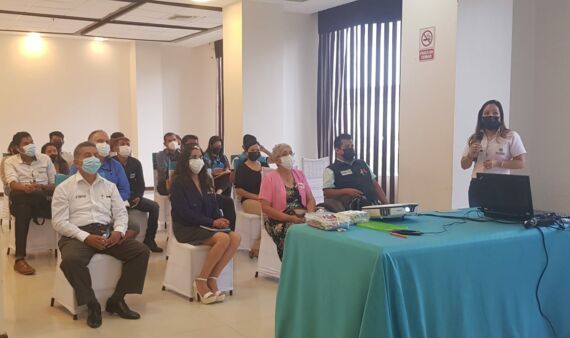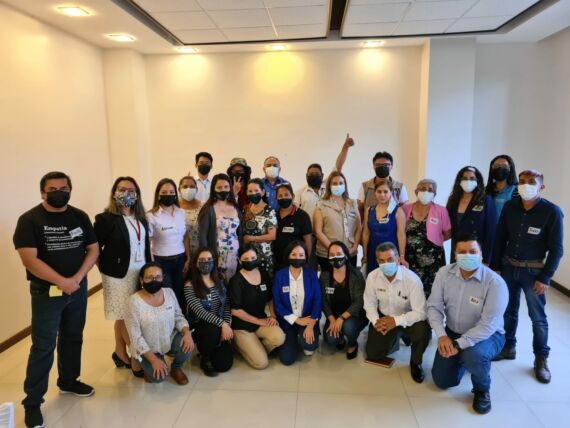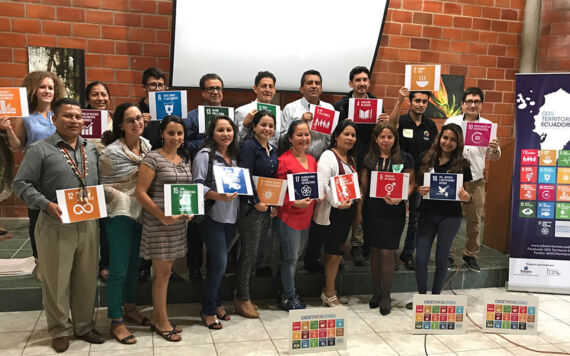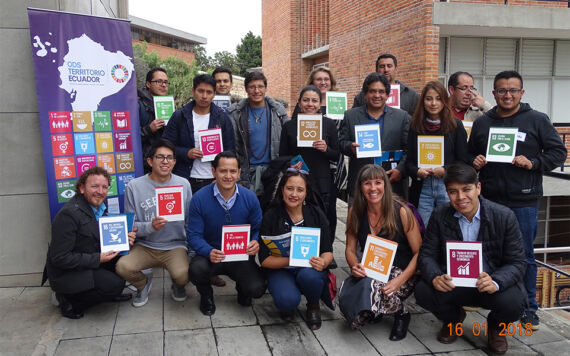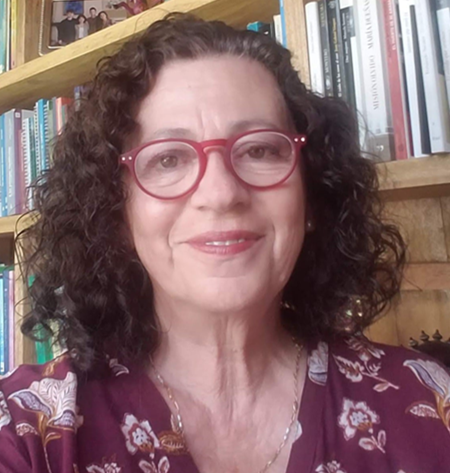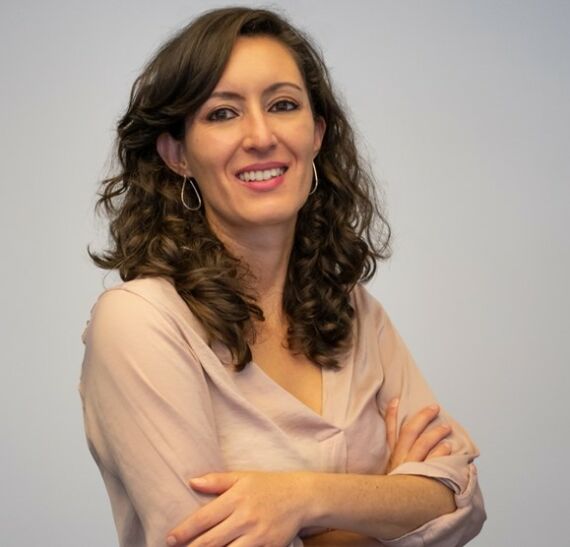| Project Name | Localizing SDGs through Multisectoral Groups and Citizen´s Observatories |
| Commisioned by | Federal Ministry for Economic Cooperation and Development (BMZ) |
| Country | Ecuador |
| Implementing Organisation | Fundación Futuro Latinoamericano (FFLA) FARO – www.ffla.net |
| Duration | November 2021 – June 2023 |
The Challenge
Increasing Inequalities: The Covid-19 pandemic has widened the social and economic gaps in Latin America and calls for an accelerated implementation of the 2030 Agenda. According to the Economic Commission for Latin America and the Caribbean (ECLAC), eradicating extreme poverty and reducing inequality in all its dimensions are among the most important development challenges in the region.
Inclusive Recovery: Inclusive economic growth combined with sustainable management of natural resources and the promotion of a green economy are development priorities in Ecuador. Economically marginalized groups are the most affected by the crisis caused by the pandemic. This calls for an inclusive recovery from the crisis which leaves no one behind.
The Objective
The project aims to accelerate the implementation and monitoring of the 2030 Agenda and the SDGs at national and sub-national levels in Ecuador through an integrated and multi-sectoral approach. A new presidential term has recently begun in Ecuador, a new national development plan has been formulated and will be implemented in the following three years. In this context, the participation of stakeholders from all sectors of society is central to promote the 2030 Agenda as a policy tool and to advance inclusive sustainable development.
The Target Group
The project focuses on provincial and local governments as well as civil society, the private sector and academia to ultimately benefit decision-makers and citizens. Based on prior experience and fruitful cooperation, the project operates in the three selected provinces of Santo Domingo, Loja and Galápagos.

About FFLA
FFLA is a non-profit organization based in Quito, Ecuador. It was created in 1993 and constituted in 1994 following the historic Earth Summit. The organization underlines that Latin America’s path to sustainability requires favorable conditions, capacities, and leadership. FFLA builds on collaborative multi-stakeholder dialogue and good governance to strengthen civil, political, and institutional capacities and articulate actions.
About FARO
FARO is an independent research and action center that generates evidence and implements initiatives to influence public policy and promote practices that lead to a sustainable society. FARO conducts research in the areas of democracy, sustainable development, education and investigation.
Website: www.ffla.net
The Approach
The project follows a three-dimensional approach.
Platforms for dialogue: Inclusive and multisectoral platforms for dialogue and collective action are created to articulate and strengthen citizen participation in the implementation and monitoring of the 2030 Agenda. Active participation and exchange is assured through regular meetings which lead to public policy proposals at provincial and national levels.
Improved statistical data: Various stakeholders, including the National Statistics Bureau and citizens, employ data collection methodologies, focussing on prioritized SDGs in the project provinces. In doing so, quality of statistical data quality is enhanced, and data gaps are identified to assure and refine the monitoring and follow-up of the SDGs compliance. Citizen generated data and the national statiscs bureau will be valuable actors in that process.
Empowerment of key actors: Agents of change Civil Society Organisations (CSOs) are empowered through virtual capacity building and citizenship initiative support. The CSOs are trained to develop concrete initiatives on gender, climate change and COVID-19 recovery to accelerate the implementation of the SDGs at the national and sub-national levels.
Achieved Results
- 8 recommendations from public policy proposals were taken up for implementation by decision makers
- 130 people from three provinces were trained to develop concrete initiatives on sustainable development, gender, and climate change
- A digital platform to monitor the implementation of the SDGs was optimized and has new functionalities such as collecting citizen driven data and mapping SDGs initiatives
- 150,000 people were reached by SDG campaign
Marianela Curi
Project Coordinator Localizing SDGs
Fundación Futuro Latinoamericano
In the context of sustainable development, what do you consider the greatest challenge that you help to overcome in your country? What is special about your project and approach, with regard to the context in which it is located?
Generate and enhance capacities for the holisitc and systemic approach to build sustainable development policies that take into consideration the different dimensions of sustainable development, looking for impacts in all of them through specific policies. The methodology that we used to improve good governance for sustainable development, bringing regularly different sectors and actors to the same space to share their vision, experiences and capacities and work together to accelerate the transition to sustainable development, and to monitor the compliance of the prioritized SDGs in their specific contexts.
Let’s get specific: What was your most significant project success? What was especially important/notable? What are you particularly proud of having achieved?
More awareness in the different actors about the importance of working together to accelerate the transition to sustainable territories, having capacities and tools to make better decisions adapted to their specific contexts and influence decision makers to comply the SDGs based on evidence, good quality information, and policies with an integral approach. The elaboration process of sustainable development policy proposals based on the prioritization of relevant SDGs for specific territories, integrating all the capacities promoted by the project. We have seven policy proposals, built in a participatory manner, to be presented to the new local authorities, with the expectation that they will be adopted by the new local administrations.
What have you learned and what experiences would you like to share with like-minded actors/practitioners?
The multisector participation and multilever coordination is key in the construction, implementation, and monitoring of public policies. An integral approach is required to implement the 2030 Agenda and to comply their 17 SDGs. Political will at all scales is an enabling condition for the transition to a sustainable development and compliance of the SDGs. This kind of process requires time because achieving sustainable development is a mid and long term process. The prioritization of the SDGs at the local level is necessary to respond to the challenges of the territory and contributes to the national compliance of the SDGs.
Sofía Suárez
Coordinator of the Sustainable Development and Cities Area
FARO
In the context of sustainable development, what do you consider the greatest challenge that you help to overcome in your country? What is special about your project and approach, with regard to the context in which it is located?
In Ecuador, the SDGs are currently only familiar to a limited group of stakeholders. Therefore, to ensure that a broader range of stakeholders are engaged in working towards their achievement, it is necessary to disseminate more information about the SDGs. In that sense, one of the project’s objectives was updating the ODS Territorio Ecuador website to make it more user-friendly and to provide valuable information about the SDGs. Also, capacity-building workshops were given to diverse stakeholders in three provinces of Ecuador to strengthen their capacities to advance in the achievement of the SDGs.
Let’s get specific: What was your most significant project success? What was especially important/notable? What are you particularly proud of having achieved?
The ODS Territorio webpage has been updated to create a platform for sharing and disseminating information on the web. One of the key adjustments made to the webpage is the ability to have multiple administrators, including three key stakeholders from the provinces where we have been working (Santo Domingo, Loja, and Galapagos). These administrators will have the capability to publish new content and publications on the webpage, thereby facilitating information sharing and dissemination. Hence, we aim to increase the importance of the webpage as a primary source of information and reference for our stakeholders.
What have you learned and what experiences would you like to share with like-minded actors/practitioners?
While we have made significant progress, there is still a lot of work to be done to engage and involve more stakeholders who can contribute to the achievement of the SDGs. Technical information about the SDGs is crucial for specific groups of stakeholders, but at the same time, it is equally important to disseminate accessible information about them among citizens. This will help raise awareness and encourage broader participation in efforts to achieve the SDGs.


